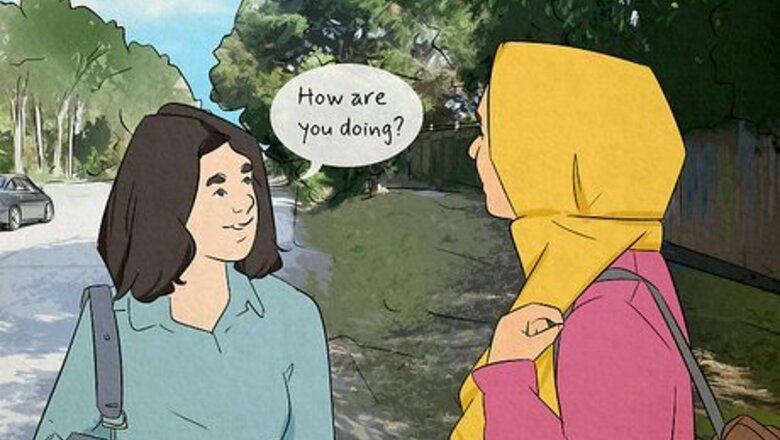
views
What does “How are you doing?” mean?

“How are you doing?” is a casual question about someone’s well-being. When asked by someone you’re close with, like a friend or family member, this informal expression asks what your personal condition is or how you’re feeling in general. Depending on the context, you might give a summary of how you’re feeling or what’s been going on in your life. If someone you don’t know that well asks you this, they might just be using it as a greeting. In this case, respond with a short, positive answer like “good” or “not bad.” You might hear the shortened form of this question as “How ya doin?” This is usually used as a polite casual greeting instead of an actual question.
When to Use “How Are You Doing?”
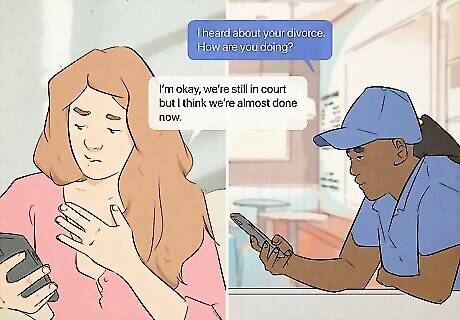
Say “How are you doing?” if you’re talking to a friend or family member. If you know they’re dealing with a difficult situation, you might add extra information to target that topic. If you’re talking to someone who has a chronic health condition, you might ask “How are you doing today?” because you know their answer may change day-to-day. You: “Monty, hey! How are you doing today?”Them: “I’m doing better than yesterday, my doctor gave me a new medication.” You: “I heard about your divorce. How are you doing?”Them: “I’m okay, we’re still in court but I think we’re almost done now.” You: “How are you doing? Have you taken your Spanish test yet?”Them: “I think I failed it, but it’s only five percent of my grade so I don’t think it will matter. How are you doing?”

Use “How are you doing?” if you haven’t seen the person in a long time. If you’re talking to someone you were close with but haven’t talked to in a long time, you can ask “How are you doing?” as a way to catch up. The other person might answer with a short response like “good” or “not bad,” and then say what has changed since you last saw each other. You: “Maddie, I haven’t seen you in forever! How are you doing?”Them: “I’m doing well! I just got a job working at the shoe factory and I’m living with my girlfriend. What about you?” You: “Hey, Mohammed! How are you doing?”Them: “I’m alright. My mother passed away last spring, so now my father is living with us, which has been a change. How are you doing?”
How to Reply to “How Are You Doing?”
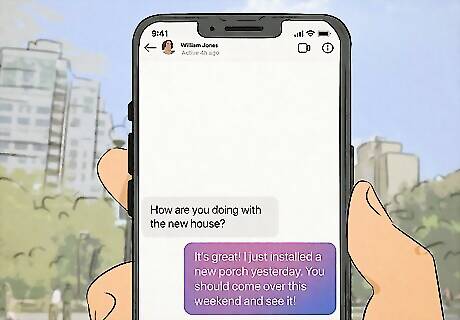
Give an honest, detailed response if you’re close to the person asking. If a friend or family member asks this question, they might be asking for a detailed, personal response. They might also follow it up with a specific situation they’re asking about, like “How are you doing with that essay?” or “How are you doing with the new job?” Them: “How are you doing with the new house?”You: “It’s great! I just installed a new porch yesterday. You should come over this weekend and see it!” Them: “Hey Sydney, how are you doing with the new baby?”You: “She’s so beautiful, but she cries all the time at night so I’m having trouble sleeping.”
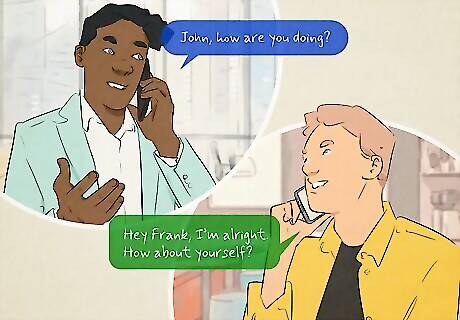
Choose a short response if you’re not close with the person asking. If someone you don’t know very well says “How are you doing?” they may just use it as a greeting. In that case, try to answer with a short, somewhat positive response like “I’m doing okay,” “I’m fine,” or “I’m great.” Then, return the question back to them. Them: “Hey, Mary! How are you doing?”You: “I’m doing well, thanks. You?” Them: “John, how are you doing?”You: “Hey Frank, I’m alright. How about yourself?” Them: “Hi Beth! How are you doing?”You: “Not bad, what about you?”
Alternative Ways to Ask “How Are You Doing?”

How are you doing with [insert specific situation]? This alternative phrase works well if you’re asking how someone is dealing with a specific situation. If you’re a teacher and a student looks like they’re struggling with a math problem, you might ask “How are you doing?” to refer to their work. You: “How are you doing with the essay?”Them: “Terrible, I only wrote a page so far. What about you?” You: “How are you doing with this puzzle?”Them: “I’m almost done with it, but it’s pretty hard. All the pieces look the same!” You: “How are you doing with the wedding?”Them: “I’ve had fun planning the event, but I’m having a hard time finding a band. Do you have any recommendations?”
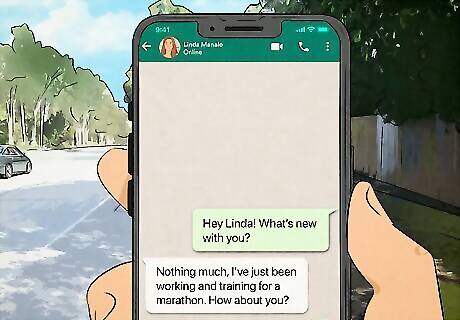
What’s new with you? This question is a great way to start a conversation with someone you haven’t seen in a long time and ask them what has changed since the last time you saw them. Usually, they’ll respond with a quick overview of what they’ve done since you last talked. “What have you been up to?” can also be used to ask this question. You: “Hey Linda! What’s new with you?”Them: “Hi Therese! Nothing much, I’ve just been working and training for a marathon. How about you?” You: “Hey Mark! What have you been up to?”Them: “I just moved to New York and I’m now working at an investment company. What about you?”
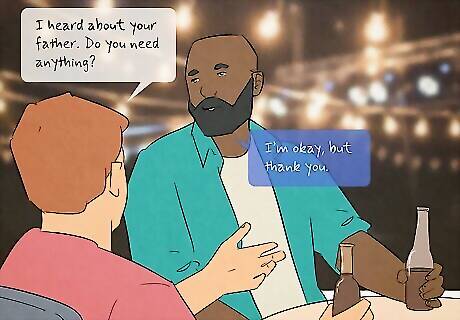
Do you need anything? Ask this question if you have something you can offer the other person that can help them with whatever they’re doing. You might ask this if you’re going to the grocery store and want to know if your friend wants anything or if someone you know just had a death in the family and you want to know how you can help. You: “I heard about your father. Do you need anything?”Them: “I’m okay, but thank you.” You: “Hey, I’m at the coffee shop right now. Do you need anything?”Them: “Yes please! I’d like a medium white chocolate latte with oat milk and whipped cream.”
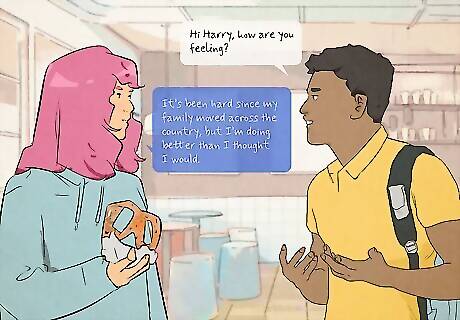
How are you feeling? You might ask “How are you feeling?” if you know that something might be affecting their emotional, physical, or mental wellbeing. For example, if your friend has been struggling with depression, you might ask “How are you feeling today?” to see if they’re doing better than they were before. In British English, you can also say “Are you OK?” to ask how someone is. In the United States, this question is used to check if someone needs medical or emotional assistance. You: “Hi Harry, how are you feeling?”Them: “It’s been hard since my family moved across the country, but I’m doing better than I thought I would.” You: “Hey Yasmine, I heard about the car accident. How are you feeling?”Them: “I’m still recovering from surgery, but the pain is better than last week.”
“How are you?” vs. “How are you doing?”

“How are you?” is a greeting and “How are you doing?” is a real question. “How are you?” is a popular greeting that’s usually used when talking to someone you don’t know or aren’t close with. Unlike “How are you doing?”, someone who asks “How are you?” typically isn’t looking for a long answer about how you’re really feeling. Instead, it’s just used as a polite greeting. However, both phrases are situational and can vary based on the context. If you respond to “How are you?” with a negative answer like “very bad,” or “not great,” the other person might ask why you’re feeling that way. Try to only respond negatively when you want to share more about something. “How are you?” is also kind of a way to say “Pleased to meet you” or “Good to see you.” In British English, “How are you?” is sometimes used as an alternative to “How do you do?”
When to Use “How Are You?”
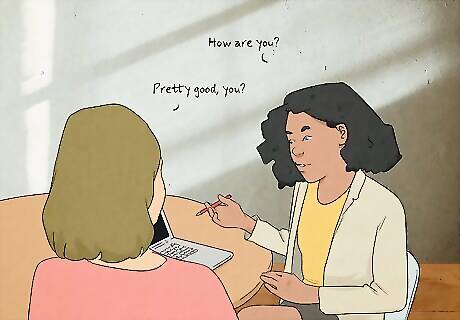
Say “How are you?” to people you don’t know well. Someone might say “How are you?” as a greeting before you start a conversation or perform a transaction. For example, a barista at your favorite coffee shop might say “How are you?” before asking what you’d like to order. You might also say “How are you?” as a friendly greeting as you’re walking by another person. You: “Hey, how are you?”Cashier: “Not bad, how about yourself?” You: “How are you?”Bank teller: “Pretty good, what can I help you with today?” You: “How are you?”Stranger on the street: “Pretty good, you?”
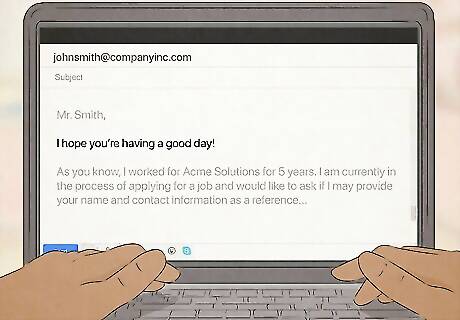
Use “How are you?” as a greeting in professional or personal emails. You can use “How are you?” as an informal opening sentence in your emails to coworkers or people you know well. However, this phrase might be too casual if you’re talking to a new client or your boss. For formal emails, here are alternatives you can use: “I hope you’re having a good day!” “I hope all is well with you.” “Thank you for your prompt response.” “I really appreciated your [message, post, etc.]. How’s your project going?” “I hope this email finds you well.” When replying to an email that includes “How are you?” it’s perfectly okay to leave the question unanswered and move directly to the email’s main subject.
How to Reply to “How Are You?”

Give a quick response like “Fine, thanks,” then return the question. When someone asks “How are you doing?” they’re typically not looking for a negative answer or one with too much detail. Instead, they’re just waiting for a quick positive response like “Great,” “Couldn’t complain,” or “Not bad.” To be polite, follow up your answer by asking how they’re doing as well. Them: “Hey, Jim! How are you?”You: “I’m fine, thanks. You?” Them: “How are ya?”You: “Never better! And you?” Them: “Hi, how are you?”You: “Not bad, and yourself?” Them: “How are you?”You: “Very well, thank you for asking. You?”
Alternative Ways to Say “How Are You?”

How’s it going? “How’s it going?” is an even more general, casual way of saying “How are you?” Usually, you use this phrase if you’re asking generally how another person’s life has been lately. If you don’t know the other person well or if you don’t want to chat, reply with a positive answer like “Great,” “I’m doing well,” or “Pretty good, you?” You: “Hey, Mike. How’s it going?”Them: “It’s going. I’m almost off of work and I was thinking about getting ice cream. Do you want to come with me?” You: “Hi Uncle Scot! How’s it going?”Them: “Not too bad! I’m halfway through the semester, but I have a lot of papers to grade. How’s it going for you?”

What’s up? This question is usually used as a casual, informal greeting. For example, a friend might say “What’s up?” as they walk over to you to start a conversation. However, in some contexts, this phrase can be used to ask what’s wrong. Your sibling might ask “What’s up with dad?” if they notice that he’s in a bad mood. You: “Hey Jordan, what’s up?”Them: “Not much, bro. I’m just chilling. Check out my new sneakers, I just got them this morning.” You: “What’s up guys?”Them: “Hey, Franklin. We were just talking about the new Fireman movie, have you seen it yet?” You: “You aren’t usually here this early. What’s up?”Them: “Nothing much. I just had to come in early for a make-up exam. I think I nailed it, though. How did you do on it?” You: “What’s up with Jo? Is she OK?”Them: “Yeah, she just realized she missed her meeting this morning and she’s been in a rut ever since. Don’t worry about it.”
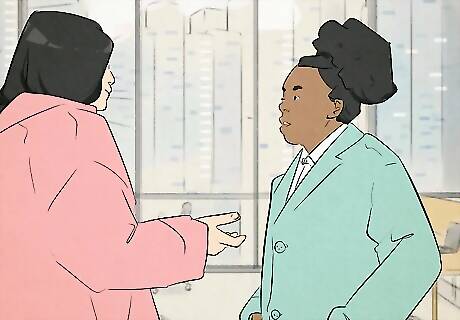
How’s your day been so far? You can ask this question to someone you know well or someone you don’t know at all as a polite way to see if they’re having a good day. If you ask someone you know well, they might respond with a more detailed, honest answer than a stranger or someone you aren’t close to. You: “Hi Mr. Humphrey. How’s your day been so far?”Them: “Couldn’t be better! I just got paid today so I’m just going out to buy a new refrigerator.” You: “Good afternoon, Kim! How’s your day going so far?”Them: “Great! I’m about to wrap up my day and go home. Do you have any plans this weekend?” You: “Hey Ben, How’s your day been so far?”Them: “Not bad, yours?”



















Comments
0 comment